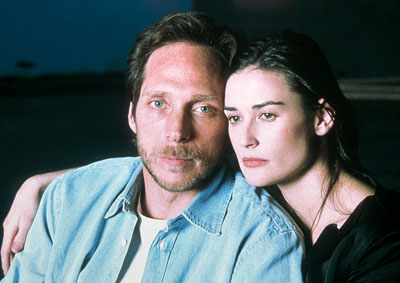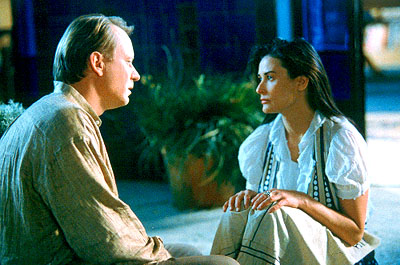

Poor Demi Moore. No matter what she does, the specter of Striptease will always hang over her head. In the meantime, she appeared in Deconstructing Harry and the less respectable G.I. Jane, but now her reputation consists of her breasts. Which is probably why she chose Passion of Mind, a new film where she must act and not show off her assets. However, Passion of Mind is probably too little, too late (or two little, two late). The film follows closely on the heels of Rachel Griffiths in Me Myself I and couple years after Gwyneth Paltrow in Sliding Doors. All three films are thematically similar in that each actress plays two characters that are actually the same person.
In Passion of Mind, Moore cannot distinguish which of these lives is real and which is the dream (also similar to Alejandro Amembar's Open Your Eyes). In one, she is Marty, a powerful career woman living in Manhattan. She is single partially because of the demands of her job and she intimidates men. When she goes to sleep, she awakens as Marie, a widowed mother with two daughters living in France. Marie reviews books for the New York Times, and when she falls asleep, Marty wakes up. So how is Moore as two characters? As roles, the characters of Marty and Marie are not that different. They merely show different facets of what could be a larger role. As Marie, Moore can show motherly emotions and as Marty, Moore can show ambition and drive. Overall, Moore is not bad and not good, but this should serve as a reminder that she can act.
The main annoyance with Ron Bass' (Snow Falling on Cedars, Entrapment) and David Field's script is that there is no motivation to find the truth. At the opening of the story, Marie confides that the dream of New York is over a year old. What did she do in the meantime? Is it too hard for Marie or Marty to fly to New York or France to find the other? Or even look for the other using other means? There are people in both lives who Moore tells. What do they think? Why don't they do something about it? When Marie meets William (Stellan Skarsgard, Time Code, Deep Blue Sea) and Marty meets Aaron (William Fitcher, The Perfect Storm, Drowning Mona), she begins to fall in love. But is she cheating? Both men are surprisingly nonchalant when Moore tells them of her dream. Each one believes that he is the real one, and the other is the dream. Both relationships are also quite dull.
Surprisingly, director Alain Berliner (The Wall, My Life in Pink) leaves the truth hidden until the very end. The clues are there, but do not make sense until the finale, but the story is still not too satisfying. However, none of the characters seem to care about the truth until Moore suddenly pieces everything together. This also goes for the audience. It's refreshing to watch a movie where the ending is not predictable, but not a good sign when no one cares. The bulk of the movie is Marty/Marie falling in love, opening up slowly to both Aaron and William, deathly afraid that her "condition" will scare away potential suitors. In both her lives, Moore has cause to hesitate, but she does anyway. In the end, Berliner and Moore manage only to stir up boredom from the viewer.